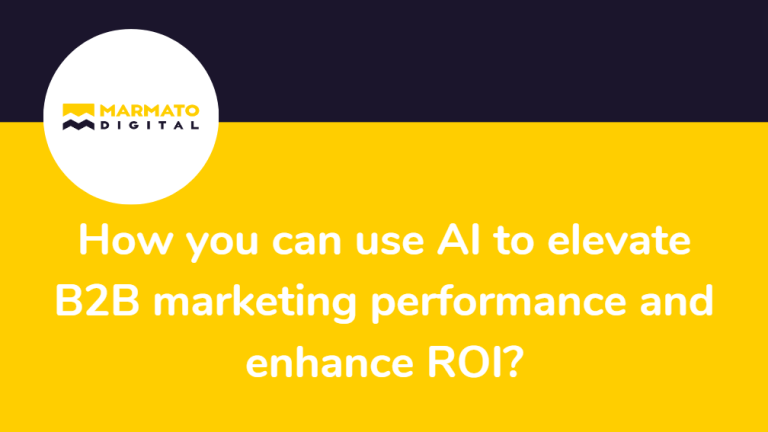The B2B marketing cycle is typically longer and more complex, involving multiple stakeholders and decision-makers. Relationships and trust are crucial, and the purchasing decisions often require a detailed understanding of each client’s needs and pain points. Let’s explore how you can use AI to enhance efficiency, improve engagement, and drive higher ROI (Return on Investment).

Strategies to Elevate B2B Marketing Performance and ROI with AI:
Leveraging AI in B2B marketing can significantly enhance performance and ROI (Return on Investment). The following strategies empower you to make data-driven decisions, improve customer engagement, and ultimately achieve higher returns on your marketing investments.
1. Enhancing Data Analysis for Better Decision-Making:
In B2B marketing, data is the foundation for understanding customer needs, preferences, and behaviors, essential for crafting effective marketing strategies. Accurate and comprehensive data allows you to segment your audience, tailor messaging, and measure the success of your campaigns.
How AI Analyzes Large Datasets?
Using advanced algorithms and machine learning techniques, AI can sift through complex datasets to uncover patterns, correlations, and insights that might be overlooked by human analysts. In addition, AI tools can integrate data from multiple sources, such as CRM systems, social media, website analytics, and market research, providing a holistic view of the market and customer behavior.
Benefits:
- Improved Decision-Making: AI-driven data analysis enables you to make informed decisions based on real-time data and insights. This leads to more accurate targeting, resource allocation, and effective marketing strategies.
- Identifying Key Trends: Artificial Intelligence can detect emerging trends and shifts in the market, allowing you to take advantage of new opportunities and mitigate potential risks.
- Customer Insights: AI provides deeper insights into customer behavior, preferences, and pain points. This understanding helps create personalized marketing campaigns that resonate with the audience, leading to higher engagement and conversion rates.
2. Leveraging Predictive Analytics for Forecasting and Strategic Planning:
In B2B marketing, predictive analytics allows you to anticipate market trends, understand future customer behavior, and make strategic decisions.
Predictive Analytics Applications in B2B Marketing:
- Forecasting Market Trends: Predictive analytics can analyze market data to identify upcoming trends and shifts, helping you to adapt your B2B marketing strategies to stay relevant and competitive.
- Customer Behavior Prediction: By examining historical customer data, AI predictive analytics can forecast future behaviors, such as purchase patterns and product preferences. This allows you to tailor the campaigns to meet the anticipated needs of the customers, improving engagement and conversion rates.
Benefits:
- Proactive Strategy Development: With predictive insights, you can develop strategies that are not only reactive but also proactive. This means preparing for future market conditions and customer needs, thereby gaining a strategic advantage.
- Optimized Resource Allocation: Predictive analytics helps allocate your resources more effectively by identifying the most promising opportunities and high-value leads. This optimization ensures that marketing efforts are focused where you can achieve the greatest impact, maximizing ROI.
3. Personalizing Marketing Efforts at Scale
Personalization helps build strong relationships and deliver relevant, impactful messages to each client. In addition, it helps address each business client’s specific needs and pain points, fostering trust and improving the likelihood of conversion.
AI-Driven Personalization:
- Customer Profiling: AI can analyze vast amounts of data to create detailed customer profiles. By understanding each client’s preferences, behaviors, and purchase history, AI enables you to segment your audience more effectively and tailor the messaging to meet the unique needs of each segment.
- Personalized Content and Communication: AI can dynamically generate personalized content and communication for each customer. This includes personalized email campaigns, targeted content recommendations, and bespoke solutions that resonate with clients’ interests and requirements.
Benefits:
- Increased Engagement: Personalization is more likely to capture the attention of business clients and keep them engaged. Clients receiving content and offers tailored to their needs are more likely to interact and respond positively.
- Higher Conversion Rates: Personalized marketing can significantly increase conversion rates by addressing each client’s specific needs and concerns. Clients are more likely to move through the sales funnel when they feel understood and valued, leading to higher sales and improved ROI.
4. Automating Marketing Processes:
Marketing automation helps to automate repetitive marketing tasks and workflows. This can include everything from email marketing and social media posting to lead management and customer relationship management. Automation helps streamline these processes, allowing marketers to focus on strategy and creative work rather than manual, time-consuming tasks.
AI-Powered Tools for Automation:
- Email Campaigns: AI-powered automation tools can manage email marketing campaigns by segmenting audiences, personalizing messages, scheduling sends, and analyzing performance. These tools ensure that emails are sent at optimal times with relevant content, improving open and conversion rates.
- Social Media Management: AI can automate social media activities such as posting content, engaging with followers, and analyzing engagement metrics. This ensures a consistent and active social media presence without constant manual intervention.
- Lead Management: AI tools can automate lead generation, scoring, and nurturing processes. By analyzing data, these tools can identify high-quality leads, prioritize them, and deliver personalized follow-ups, moving leads through the sales funnel more efficiently.
Benefits:
- Operational Efficiency: Automating B2B marketing reduces manual intervention, allowing your marketing teams to operate more efficiently. Tasks that once took hours can be completed in minutes, freeing up time for strategic activities.
- Consistent Communication: AI ensures timely and consistent communication with prospects and clients. Automated workflows can maintain regular touchpoints with leads and customers, enhancing engagement and trust.
- Time Savings: Your B2B Marketing teams can save significant time by automating repetitive tasks. This allows them to focus on higher-value activities such as campaign planning, creative development, and strategic analysis, leading to better overall marketing performance.
5. Optimizing Lead Generation and Qualification:
In B2B marketing, identifying potential leads, determining their quality, and nurturing them through the sales funnel requires significant time and resources. Key challenges include targeting the right audience, distinguishing high-quality leads from low-quality ones, and maintaining consistent engagement to convert leads into customers.
AI Solutions for Optimizing B2B Marketing Lead:
- Identifying High-Quality Leads: AI tools can analyze vast amounts of data to identify potential leads that match predefined criteria. By examining factors such as company size, industry, online behavior, and engagement history, it can pinpoint leads with the highest likelihood of converting into customers.
- Predictive Lead Scoring: AI-driven predictive lead scoring uses machine learning algorithms to assess and rank leads based on their conversion likelihood. By analyzing historical data and lead behaviors, it can assign scores to leads, helping sales teams prioritize their efforts on the most promising prospects.
- Automated Nurturing: AI can automate the lead nurturing process by sending personalized content and follow-up messages at optimal times. This keeps leads engaged and helps them progress smoothly through the sales funnel.
Benefits:
- Higher Quality Leads: You can focus your efforts on high-quality prospects by leveraging AI to identify and score leads. This increases the chances of converting leads into customers, improving overall sales performance.
- Improved Conversion Rates: Predictive lead scoring and automated nurturing ensure that leads receive relevant and timely communication, increasing the likelihood of conversion.
- Efficient Sales Funnel: AI streamlines the lead generation and qualification process, making it more efficient and effective. Automation reduces the time and effort required to manage leads, allowing sales teams to work more efficiently and close deals faster.
6. Enhancing Customer Experience and Retention:
Positive interactions and consistent support can significantly influence a client’s decision to continue business with a company. Excellent customer experience fosters trust, satisfaction, and loyalty, which is essential for retaining clients and encouraging repeat business.
AI Applications:
- Chatbots: They respond instantly to customer inquiries, offering support and information anytime without waiting for a human representative.
- Virtual Assistants: They can manage routine tasks such as scheduling meetings, sending reminders, and providing personalized recommendations based on user data. This helps streamline communication and improves the overall efficiency of customer interactions.
Benefits:
- 24/7 Customer Service: Chatbots and virtual assistants provide round-the-clock support, ensuring customers can receive assistance whenever needed. This constant availability improves customer satisfaction and reduces response times.
- Improved Satisfaction and Loyalty: You can enhance the overall customer experience by delivering timely and personalized support. Satisfied customers are more likely to remain loyal to the company, reducing churn rates and increasing the likelihood of repeat business.
- Efficient Issue Resolution: AI tools can quickly identify and address customer issues, often resolving problems before they escalate. This proactive approach helps maintain positive relationships and ensures clients feel valued and supported.
7. Conducting Competitive Analysis:
Analyzing competitors’ strategies, strengths, and weaknesses can help you develop more effective marketing strategies, anticipate market shifts, and make informed decisions to maintain a competitive edge.
AI-Driven Competitive Intelligence:
- Monitoring Competitors: AI can continuously track competitors’ activities across various channels, including websites, social media, press releases, and marketing campaigns. This real-time monitoring provides up-to-date insights into competitors’ actions and strategies.
- Analyzing Strategies: AI can identify patterns and trends in competitors’ marketing tactics, content performance, customer feedback, and market positioning by analyzing their approaches.
Benefits:
- Identifying Opportunities and Threats: Helps to alert companies to potential threats, such as new market entrants or shifts in competitor strategies, allowing for proactive responses.
- Informed Strategic Decisions: AI provides a comprehensive view of the competitive landscape, enabling marketers to make data-driven strategic decisions.
8. Measuring and Improving ROI
Understanding ROI helps you allocate resources efficiently, justify marketing expenditures, and demonstrate the value of marketing efforts to stakeholders.
How AI Improves ROI?
- Cost Efficiency: AI streamlines marketing processes, reducing the time and resources needed for data analysis, content creation, and campaign management. This efficiency lowers operational costs, contributing to a higher ROI.
- Targeted Marketing: AI enables more precise targeting by analyzing customer data to identify the most promising leads and tailor marketing efforts accordingly.
- Performance Tracking: AI tools provide real-time analytics and performance tracking, allowing you to identify what’s working and what’s not quickly. This immediate feedback enables continuous campaign optimization, leading to better results and higher ROI.
Conclusion:
AI has the potential to revolutionize B2B marketing by providing deeper insights, streamlining processes, and enabling more effective and personalized interactions. Its ability to analyze vast datasets, predict trends, automate tasks, and personalize communication allows B2B marketers to operate more efficiently and achieve better results. Integrating AI into marketing strategies can significantly improve engagement, conversion rates, customer satisfaction, and overall ROI.
Leveraging AI to Enhance Marketing Performance and ROI!
As the digital landscape continues to evolve, integrating AI into your B2B marketing strategies is essential for staying ahead of the competition and driving growth. By integrating AI tools and technologies, you can transform your approach, deliver more value to your clients, and achieve superior marketing performance.
If you’re ready to take your B2B marketing to the next level, Marmato Digital is here to assist you. Contact us for further resources, consultations, and personalized guidance on implementing AI in your marketing strategy. Let’s work together to unlock the full potential of AI and achieve remarkable marketing performance and ROI.
Subscribe to Newsletter
Get our latest blogs directly to your inbox.

